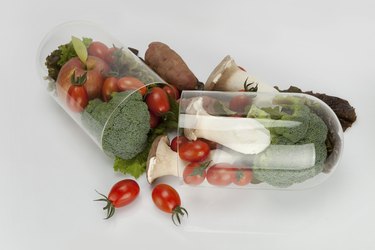
Gastritis, which occurs when the inside wall of the stomach is inflamed, interferes with the absorption of some vitamins and minerals. Taking a multivitamin is a good way to fill nutritional gaps caused by gastritis, but you may need to pay extra attention to a few individual vitamins and minerals.
Talk to your doctor to see whether you need more vitamin C, vitamin B-12 or iron than you'll get from a multivitamin, and never take supplements without first consulting your physician.
Video of the Day
Video of the Day
Impact of Bacteria on Nutrients
Helicobacter pylori, or H. pylori, is the most common cause of gastritis, reports the National Institute of Diabetes and Digestive and Kidney Diseases. As H. pylori bacteria attach to the stomach lining, they trigger inflammation that can damage the lining if the infection isn't treated.
A review in the September 2014 issue of the World Journal of Gastroenterology reported that H. pylori is associated with deficiencies of multiple nutrients, including two antioxidants -- vitamin E and selenium -- and beta-carotene, which the body converts into vitamin A.
Taking some varieties of multivitamins can help boost your levels of all three nutrients, but check the labels when you shop. Most multivitamins have vitamin E, and they'll probably contain selenium if they also have minerals. But you won't find beta-carotene in all brands.
Iron Deficiency
H. pylori infections are associated with a low level of iron, which contributes to iron-deficiency anemia. Bacterial damage to the lining reduces the amount of stomach acid and low acid interferes with iron absorption. The bacteria also need iron to stay alive, so they may steal some from the body.
A multivitamin with iron may be sufficient to prevent or treat an iron deficiency from H. pylori-related gastritis, but first you need to know whether you're deficient or not. Iron becomes toxic if you're not deficient and you start consuming more than you need. Work with your doctor to determine the right dose for your overall health.
Vitamin B-12 Shortage
When gastritis is caused by H. pylori or an autoimmune disorder, it can develop into atrophic gastritis, which is marked by a significant drop in hydrochloric acid. The vitamin B-12 consumed through food comes attached to proteins. Proper digestion depends on hydrochloric acid in the stomach to separate the vitamin from its protein. Without enough acid, you're at risk for developing a deficiency.
If you have gastritis, the vitamin B-12 in a multivitamin can help you avoid a deficiency. The form of B-12 used in supplements doesn't need stomach acid, reports the Office of Dietary Supplements.
Vitamin C Helps Heal
H. pylori destroys vitamin C normally found in the stomach lining by converting it into other substances. As a result, cells in the lining have less antioxidant protection and they're more vulnerable to damage from the bacterial infection, reports Digestive Diseases and Sciences in October 2012.
On the flip side, supplemental vitamin C fights the bacterial infection, offsets the inflammation and helps gastritis heal. The vitamin inhibits the growth of H. pylori on its own and improves H. pylori eradication by about 50 percent to 78 percent when it's used with medications, according to studies cited in Digestive Diseases and Sciences.
- National Institute of Diabetes and Digestive and Kidney Diseases: Gastritis
- World Journal of Gastroenterology: Role of Helicobacter Pylori Infection on Nutrition and Metabolism
- Office of Dietary Supplements: Vitamin B-12
- Digestive Diseases and Sciences: Vitamin C, Gastritis, and Gastric Disease: A Historical Review and Update